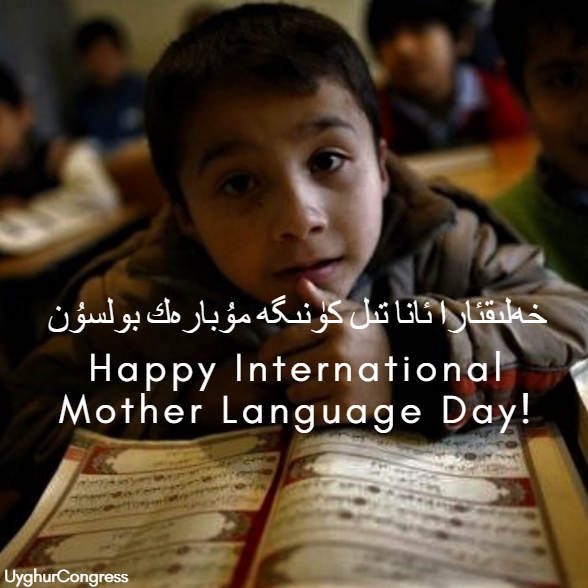The World Uyghur Congress Supports UNESCO’s International Mother Language Day

Press Release – For immediate release
21 February 2017
Contact: World Uyghur Congress www.uyghurcongress.org
0049 (0) 89 5432 1999 or [email protected]

The World Uyghur Congress, on this 17th anniversary of the inauguration of UNESCO’s International Mother Language Day, would like to recognize the importance of the preserving traditional languages amid often tremendous pressure to assimilate. This issue is of particular importance to the Uyghur people as the Uyghur language has been under threat for decades.
On May 16, 2007, the UN General Assembly called upon Member States “to promote the preservation and protection of all languages used by peoples of the world”. Since 2000, the UN and its composite states have recognized this day as a means to promote multiculturalism and greater inclusiveness in a world that is becoming increasingly homogenous.
According to UNESCO, “The date represents the day in 1952 when students demonstrating for recognition of their language, Bangla, as one of the two national languages of the then Pakistan, were shot and killed by police in Dhaka, the capital of what is now Bangladesh.” This serves as a potent reminder of the power that language and culture has, but also some of the dangers of a society fragmented along cultural or linguistic lines.
In relation to the Uyghur language, broad issues have only been exacerbated by state policies over the last decade. Recent policies have signalled a move away from the historic “separate but equal” approach to ethnic groups, with greater focus on integration.
China continues a policy meant to undermine Uyghur culture in an attempt to further assimilate those that do not conform to the Chinese culture and language. Mass migration of Chinese over the past decades into East Turkestan has exacerbated tensions between the two groups, as discrimination and significant inequality remains widespread between the two groups.
As a result, language rights have become increasingly contentious. The right to operate Uyghur language schools has been largely supplanted by the exclusive study of Mandarin in some cases. Employment opportunities in cities have dwindled for those without knowledge of Mandarin, further excluding large swaths of the Uyghur community who have limited working knowledge of the language.
Encroaching Chinese policies that look to dilute its use in favour of Mandarin have worked to push families to enrol their children in Mandarin language schools out of fear that they may fall behind without a working knowledge of the language.
Activism in relation to language rights has also been curtailed as Uyghur language-rights activist, Abduweli Ayup, was arrested and remained in prison for over a year before being released. He was charged with operating a Uyghur-language school for children as a means to preserve the use and of the language, before being deemed illegal by the state.
James Millward, professor of Intersocietal History at Georgetown University (and researcher on Central Asian and China) argues that “Whereas old rhetoric and policies stressed distinctiveness between different groups in China, then, the new language encourages or suggests erasure of those distinctions.” Much of the evidence that we have gathered out of the region supports this suggestion.
UNESCO states that the promotion of diversity through language serves to “…encourage linguistic diversity and multilingual education but also to develop fuller awareness of linguistic and cultural tradition…and to inspire solidarity based on understanding, tolerance and dialogue.”
As a reminder on this day, the World Uyghur Congress would like to call for increased inclusiveness for minority and indigenous languages so that cultures may continue to thrive within their own space. Multilingualism and multiculturalism go hand in hand and by sustaining these institutions we act to promote harmony, inclusivity and understanding in the process.

